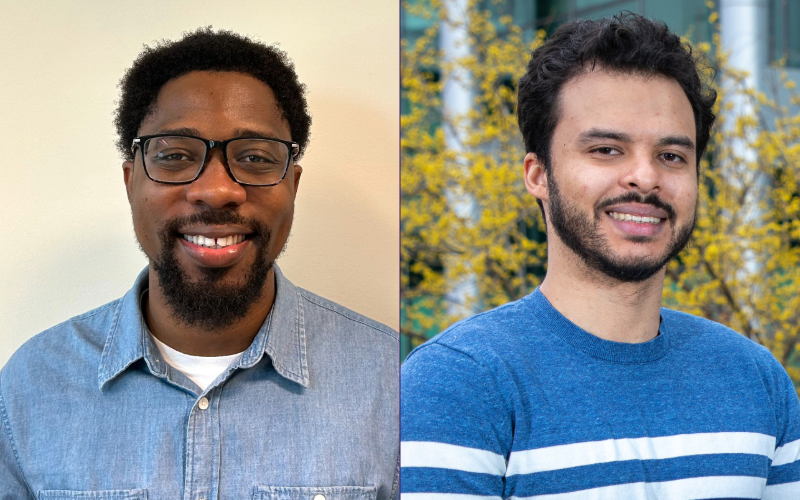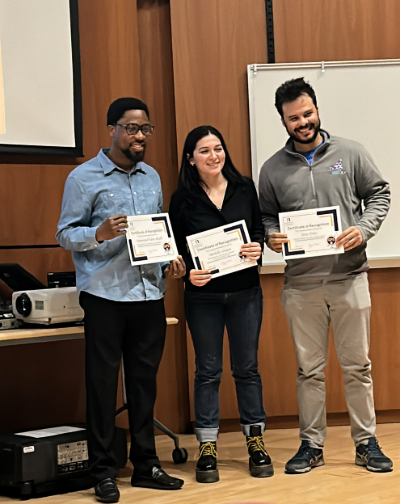UAlbany STEM Faculty Launch ‘Graduate Pathway for Scholars’ Program for PhD Students in Biology and Chemistry

By Erin Frick
ALBANY, N.Y. (April 25, 2024) — University at Albany PhD candidates Emmanuel Edem Adade and Jesus Frias have been named inaugural Fellows in the “Graduate Pathway for Scholars” (GPS) program, a newly launched initiative spearheaded by Distinguished Professor Marlene Belfort, Williams-Raycheff Endowed Professor and Associate Vice Provost for the Learning Commons Rabi Musah and Associate Professor Cara Pager, all of whom are affiliated with the RNA Institute in the College of Arts and Sciences. Michelle Urman, a fourth-year PhD student in the biology program, was acknowledged with an honorable mention.
“Graduate Pathway for Scholars” is for UAlbany graduate students in the departments of biology and chemistry who wish to pursue careers in academia. The program aims to bring scholars who receive their PhDs at UAlbany back as faculty members to open positions after completing their postdoctoral training at other institutions.
The program’s inaugural Fellows were recognized at a ceremony in the Life Sciences Research Building on April 4 and will deliver research presentations at the Black Indigenous Latinx and People of Color (BILPOC) Faculty Advancement Initiative’s “Lifting, Climbing and Thriving Conference” on April 26 at 2:15 p.m. in the Campus Center Boardroom.
“The Graduate Pathway for Scholars program is for talented PhD students in biology and chemistry, with a focus on students from underrepresented and underserved backgrounds,” said Marlene Belfort, who serves as senior advisor of the RNA Institute. “We are creating a pathway for the GPS Fellows to create professional ties and build community at UAlbany, with the hope that these connections will help attract them back to the University after they have completed their postdoctoral studies elsewhere.”
Incentives for GPS scholars include an initial monetary award, the title of “GPS Fellow” and eventual affiliation with UAlbany’s BILPOC Faculty Advancement Initiative. Fellows will have access to mentoring relationships, experiential learning opportunities, and fora to share their research with senior peers in academia.
“By offering professional development opportunities and access to a supporting and welcoming community at UAlbany, we hope the GPS Fellows will be encouraged to return ‘home’ to UAlbany as junior faculty,” said Belfort.
To be eligible for the GPS Fellowship, graduate scholars must have advanced to “candidacy” and be in at least their fourth year of graduate study. Interested scholars must complete an application form, and a letter of support from their thesis advisor, endorsed by the scholar’s department chair is also required.
The next award cycle will begin in January 2025 with applications due in early Spring. For more information, contact [email protected].
Meet the Inaugural GPS Fellows
Emmanuel Edem Adade is in the fifth year of his PhD program, working with Associate Professor Alex Valm in the Department of Biological Sciences and the RNA Institute. Adade joined Valm’s lab in Spring 2020, drawn by a shared interest in microbiome research, investigating the complexities of host-microbiome interactions, and using advanced microscopy to visualize microbial assemblies.
“My mum is a teacher and I think that’s where I got my love for teaching,” said Adade. “I am interested in pursuing a career in academia because of my passion for teaching, conducting research and mentoring others. As an international scholar, I see the GPS program as a pivotal opportunity for additional mentorship, support and professional development to facilitate my transition from being a graduate student to a postdoc and eventually a faculty member. I am eager to realize my dreams and make meaningful contributions in academia.”
Adade’s research focuses on the microbes that have coevolved to live inside other animals, and how their interactions—both with other microbes and with their host—impact multiple aspects of the host’s health and development. By examining gut microbes within zebrafish, Adade is working to shed light on the inner workings of the human gut microbiome.
“As a GPS Fellow, I’m looking forward to receiving the support and guidance necessary to effectively navigate my early-stage scientific career. Ultimately, my passion extends to being able to scientifically enrich the department where I received my doctoral training, leveraging my diverse background to contribute as both as a faculty member and as an individual.”
After completing his PhD Adade plans to pursue a postdoctoral fellowship to further his expertise in microbiome studies and technological advancements that allow for better understanding of host-microbe interactions using model animal systems.
Jesus Frias is a sixth-year PhD student, working with Professor Andy Berglund and Research Faculty Kaalak Reddy in the Department of Biological Sciences and the RNA Institute. Frias’s PhD work has focused on seeking new therapeutic drugs that could help treat myotonic dystrophy type 1 (DM1), the most common form of adult-onset muscular dystrophy affecting about 1 in 8,000 people worldwide.
“I was introduced to research through the UAlbany Summer Research program, an initiative of the Collegiate Science and Technology Entry Program and the Office of Access and Academic Enrichment,” said Frias. “I was placed in Associate Professor Paolo Forni’s laboratory in the Department of Biological Sciences as an undergraduate. My time in the Forni lab working on development of the olfactory system motivated me to continue advancing in the field of research.”
Frias will complete his PhD in May before heading to Baylor College of Medicine to undertake postdoctoral work studying myotonic dystrophy type 1 disease mechanisms using multiple mouse models.
“I want to stay in academia to continue studying complex diseases such as myotonic dystrophy and to keep growing as a scientist. I also want to become a mentor to others who want to become scientists, as I would not be where I am today without the mentorship of Paolo Forni through my undergraduate years, Andy Berglund, who is my PhD advisor, and many other people who have helped me throughout my training.
“The affiliation with UAlbany’s Black Indigenous Lantinx and People of Color (BILPOC) Faculty Advancement Initiative attracted me to the GPS program, and it is also what I look forward to the most about being a GPS Fellow, as it will provide a community of people that can provide mentorship as I continue my career.”





